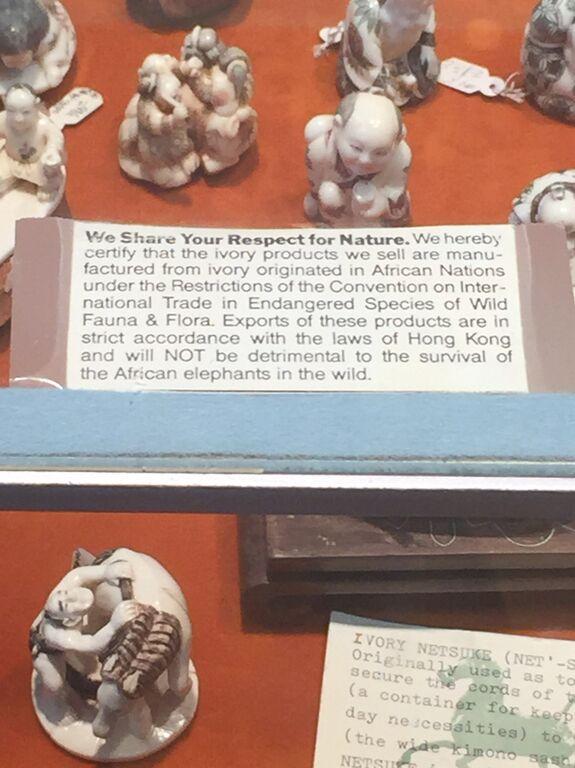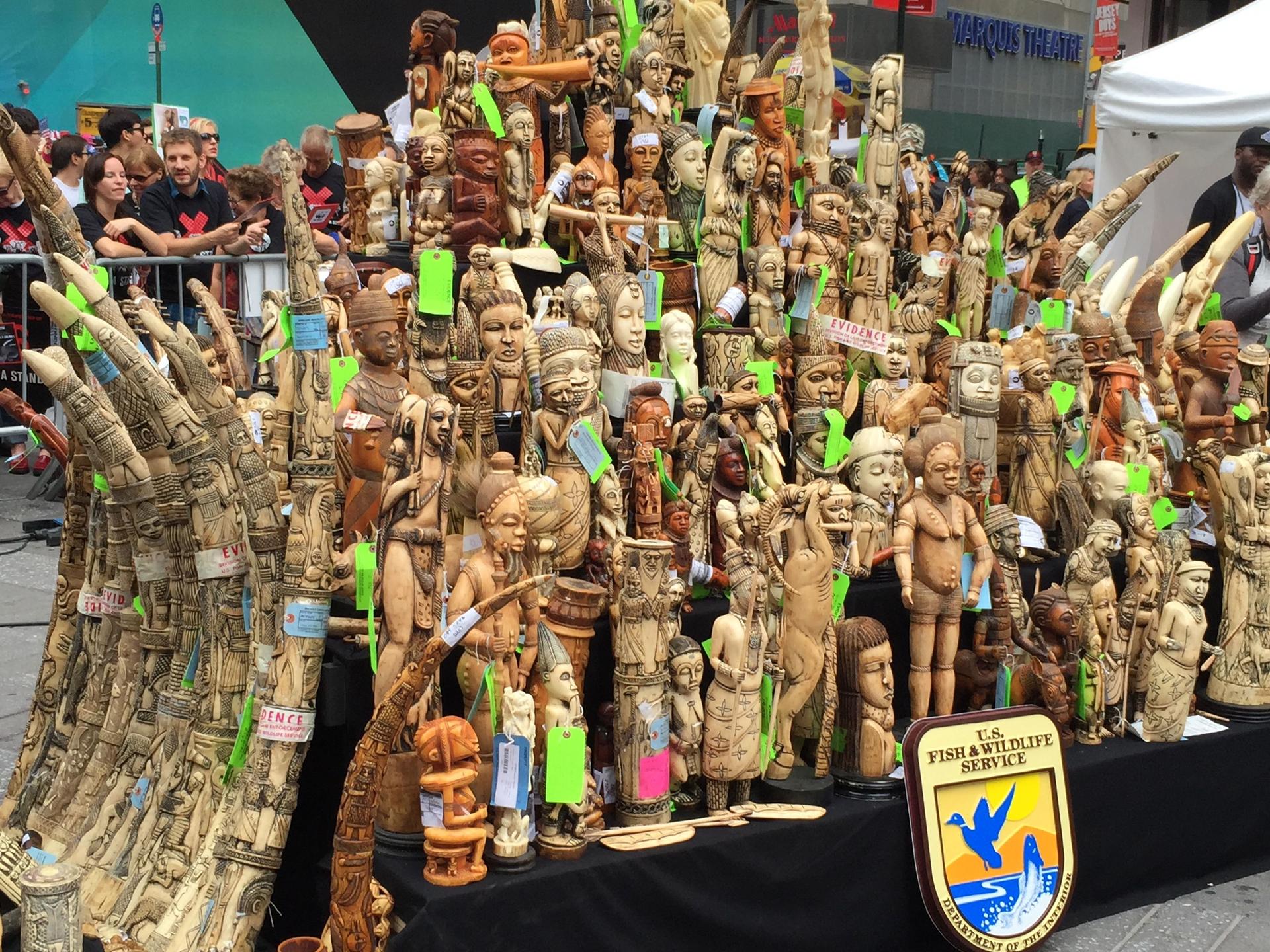Despite big efforts, the US is still a major consumer of illegal elephant ivory
A display of ivory figures later destroyed in an ivory crush in Times Square this June.
The air in New York’s Times Square is thick with gritty, white dust — all that remains of hundreds of pieces of elephant ivory.
The piles waiting to be crushed include carved tusks, decorations and jewelry, ranging in size from little trinkets to large ornate statues. All of it was previously seized by federal agents, and much of it is tagged as evidence.
Piece by piece, these objects ride up a long conveyor belt at Broadway and 46th Street and topple into a giant crusher.
Antique ivory is legal in the United States, but these pieces are made from recently poached ivory, disguised to look old. Few penalties and skyrocketing prices make this crime increasingly attractive to terror groups and organized crime.
For this reason, the US government considers wildlife trafficking a national security issue. Last year, President Barack Obama’s administration created a strategy to deal with it. Interior Secretary Sally Jewell, who leads a government taskforce on illegal ivory, spoke at the Times Square crush.
“We have transnational organized crime networks that see this as a low-risk and high-profit market. We are part of the problem. We must also be part of the solution,” she said.
That solution includes a unique coalition of players — conservation groups, USAID, the Department of Justice, and Homeland Security — all working to better enforce the law and reduce the demand for these products by raising public awareness.
But for now, the United States remains a major player in the global market for elephant ivory.
“What a lot of people don’t realize is that the U.S. is actually one of the top ivory markets in the world,” says Elly Pepper, an expert on the U.S. ivory market at the Natural Resources Defense Council (NRDC).
Pepper says part of the problem is US ivory laws are confusing and hard to enforce.
“The US has permitted a limited legal market for years, but since it is so hard to date ivory — it requires DNA testing or bomb carbon dating, which are expensive and not widely-available processes — people sneak new ivory onto the shelves under the guise of old ivory,” she says. “That’s why while the US has banned most ivory for so long, it hasn’t really mattered. It just created this parallel illegal market."
New York City has long been at the heart of this, but new, strict state bans in the region mean there’s little ivory to see here.

In San Francisco’s Chinatown, there are blocks of stores that sell at least some ivory. The Man Hing Ivory Imports store even has a Yelp page, despite the fact that importing ivory here has largely been illegal for decades.
California may soon pass a ban like New York’s, and word seems to be getting out. The windows of shops specializing in ivory are filled with posters advertising half-off and going out of business sales.
But for now, it’s still the wild west.
Attorney Zak Smith joins me for some browsing. He’s Pepper’s colleague at the NRDC.
“Some of the people working at these stores were absolutely up front about the fact that they were selling elephant ivory that was illegal, and that they would help you obtain documents to facilitate you being able to sell that ivory in New York, which right now has quite strict laws against the sale of ivory,” he says. “I was amazed. I did not expect that.”
Elly Pepper says the amount of illegal — or new — ivory that’s on store shelves recently doubled. It makes up roughly half of all ivory for sale here.
“What this means is that the amount of antique faking and the amount of pretending that ivory is old when it’s actually new is just becoming more common,” she says.
Bob Dreher, the associate director of the US Fish and Wildlife Service, says they’ve reached the same conclusion.
“We think that the current market provides cover for illegal ivory coming into the United States and permits poachers to profit from their crimes, so we are looking for a way to take the United States out of that equation,” he says.
But progress has been slow and hard won.
“The United States still has a problem with illegal ivory, in no small part because of a wide range of communities — whether it’s gun owners or musicians or antique dealers — they’ve raised concerns about a proposed fish and wildlife service rule and they’ve pushed back fairly hard,” says Delaware Senator Chris Coons, who is one of several lawmakers addressing this issue on Capitol Hill.
Bipartisan bills before the House and Senate seek to increase the penalties for violating federal law. Right now people who are convicted face small fines or months in prison. If passed, the new measures would equate wildlife trafficking with other forms of the crime, such as drugs or weapons.
Senator Coons applauds the Wildlife Trafficking Enforcement Act, which was put before Congress earlier this year. If passed, it would establish penalties of up to 20 years in prison, or a half million dollars in fines.
“I think there’s a role for congressional action here, and I commend Senators Graham and Feinstein for starting on strengthening some of the rules and criminal penalties around trafficking in illegal wildlife products,” he says. “But I think there’s room for us to do more.”
Bob Dreher says the fish and wildlife service is also working on a variety of new restrictions.
“We have been considering and are very, very close to issuing a proposed regulation that would substantially eliminate interstate trade in ivory in the United States,” he says.
More than 20 states are also considering their own ivory bans. That’s important because federal rules don’t apply to trade within a state’s borders. Places to watch include California and Connecticut.
California: because it has a very large ivory trade. And Connecticut: because tight restrictions in neighboring states could push New York City’s illegal market across its border.
